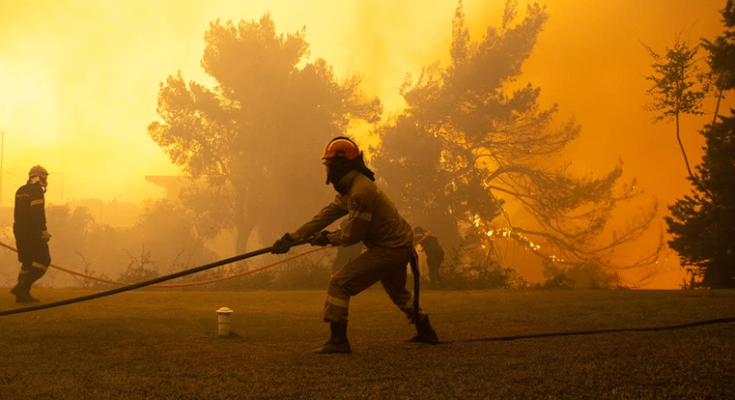
Two bodies were recovered as a wildfire rages near the resort town of Xylokastro, west of Corinth early on Monday.
The charred bodies were discovered near the village of Elliniko in the area where two men have been reported missing since Sunday night. Reports suggest that two people rushed on a motorbike to help a friend protect his flock of sheep from the wildfire.
Firefighters urged them not to approach the location due to the raging wildfire.
The wildfire which broke out on Sunday is burning in a hard-to-access area and is fueled by gale-force winds.
Hundreds of firefighters battle the wildfire near Corinth
A total of 208 firefighters with 9 ground teams, 59 fire trucks, 13 airplanes and 6 helicopters (including one coordinating operations) are at the site. Assistance is also being provided by volunteer firefighters, water trucks and large works machinery from the region of Peloponnese, as well as from the Armed Forces.
Residents of several nearby villages were told to evacuate on Sunday.
A Fire Service spokesman said that 27 forest fires have erupted across Greece in the last 24 hours, most of which were brought under control.
Greek authorities triggered a red warning in several regions for Sunday and Monday due to winds of up to 75 kilometers per hour.
Drought and heatwaves cause wildfires
The Mediterranean country, prone to drought and heatwaves, experienced the worst forest fire in its history in August, northeast of the capital Athens, with thousands evacuated and one dead. The fire in the suburbs of Athens left one dead and accounted for the destruction of many homes and businesses. Firefighters discovered the body of a woman at a building in Patima, Vrilissia. The woman was trapped in the building of a business.
Scientists have long warned that human-induced climate change is driving longer-lasting, more intense and more frequent heatwaves, along with other extreme weather events.
Scientists warn that several parts of Greece, particularly the islands of the Aegean, have been facing drought as rainfall has been halved over the last decade and water reserves are being depleted.
Rainfall in many areas of Greece has decreased by up to a staggering 50 percent in previous months compared to the average of the last decade, according to research by the National Observatory of Athens network and the Meteo.gr team.
The research found a significant drop in total rainfall in most areas from October 2023 to April 2024, the period when most rainfall occurs in Greece. The only exceptions to the trend are parts of Epirus and Western Macedonia. The comparison was made with the average of the corresponding seven-month period of 2012-2022.



